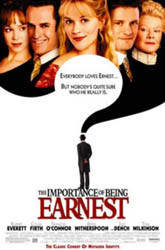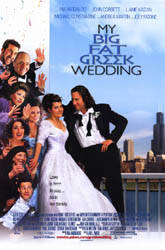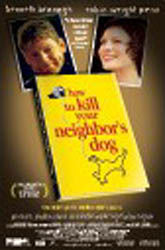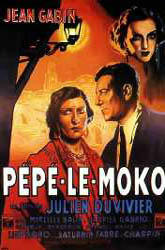 Director: Starring:
OTHER REVIEWS: Gosford
Park An
Ideal Husband Notting
Hill Up at the
Villa |
The Importance of Being
Earnest BY: DAVID PERRY One reader recently e-mailed me to ask why I use outside quotes so often. I answered, "Through my years as both a film viewer and book reader, I have picked up collections of quotes that stick to me. Unlike the epigram collections by Forrest Gump (née Winston Groom) and Rudy of Survivor, my wit and wisdom comes from other people: Nietzsche, Kierkegaard, Rilke, Thoreau, Sartre, Longfellow, Steinbeck, et al. Whenever I see a film that brings to mind one of these quotes, I jump at the chance to use it. Occasionally I look up quotes (as I had to do last week with two of my three Frailty quotes), but most of the times you see a quotation mark in one of my reviews, chances are it's some little colloquialism or axiom that I just could not get out of my head and wanted to share with all my readers. I guess it is my niche." Though I don't think I've ever used one for a review, a large amount of my quote collection comes from the witty mind of Oscar Wilde. Through his plays, Wilde has made his mark in Bartlett's Familiar Quotations as well as the Oxford and Webster quotations dictionaries. His biggest and best works -- The Picture of Dorian Gray, An Ideal Husband, A Woman of No Importance -- have created nearly as many fine quotes as Shakespeare, though no single work can compare in its quotability -- from Shakespeare, Wilde, or another -- than Wilde's The Importance of Being Earnest. The play, his final work before going to English prison for being openly gay, is like a treasure trove of memorable lines, all humorous. "In married life three is company and two none," "Relations are simply a tedious pack of people, who haven't got the remotest knowledge of how to live, nor the smallest instinct about when to die," and "To lose one parent, Mr. Worthing, may be regarded as a misfortune; to lose both looks like carelessness" automatically come to mind, with many more on the backburner. The latest film adaptation of the play may be a tough concoction of cinematic dallying with the original text, but the reason why Oliver Parker's latest Wilde production succeeds are in that oh so wonderful dialogue. Parker last worked with Wilde in 1999 when he made the marvelous adaptation of An Ideal Husband, which transcended the original work into a form more than becoming its tone and purpose. I had not read An Ideal Husband before seeing the movie, which may have helped my enjoyment of the film, for I was unable to nitpick over any changes, only feeling rewarded by what I was privy to. That's not the case with The Importance of Being Earnest, which I have read and know well. Every use of artistic license by the filmmakers seems to jump out like a panther attacking. When Parker portrays knight and damsel dreams for young and impressionable Cecily (Witherspoon), I worried where the film was going; when Parker subjects flirty femme Gwendolen (O'Connor) to a bare-cheeked tattoo, I cringed for dear Oscar. Though the settings, edits, and occasional flashes have been changed (in some cases to show off the grand sets and locales used for the film, in other cases to infuse the film with some humor that's slightly more contemporary in nature), the story remains much the same: Jack Worthing (Firth) is an English gentleman of wealth who leads a double life. In the country, he is Uncle Jack to his young ward Cecily Cardew, the granddaughter of the man who became Jack's guardian upon discovering Jack as a baby in a handbag. In the city, he is Ernest, a meager man who can dine with the showgirls and shirk his tab at the Savoy. As Ernest, Jack has found a friendship with Algernon Moncrieff, who learns of Jack's double life and of his beautiful, rich niece. To get closer to Cecily, Algernon decides to travel to Jack's country manor in Woolton telling everyone that he is Jack's brother Ernest. Algernon as Ernest proposes to Cecily; Jack as Ernest proposes to Gwendolen Fairfax, Algernon's cousin. Trying to decide some way to break it to their betrothed that they are not who they have said they are, Algernon and Jack soon find even more trouble as the two women finally meet and compare notes. Oscar Wilde's dialogue comes to life from performers who are well equipped to throw the masterful values and barbs. Firth and Everett (who previously played a Wilde role in Parker's An Ideal Husband) have a perfect rapport between them, playing friends who are constantly at odds. Meanwhile, O'Connor and Witherspoon delicately balance their characters' statuses and their dainty attempts to beguile their lovers. However, some of the finest scenes come from supporting players Wilkinson (as a local priest), Massey (as Cecily's tutor), and Dench (as Gwendolen's mother), who have in their careers played roles that had that prickly Oscar Wilde comic edge. These actors all do gangbusters with the Wilde work, which remains consistently enjoyable throughout. The only real problems are in the Oliver Parker changes, most of which are unneeded and only cause the film to lose much of its ideal timing. Wilde wrote in Intentions "Every great man nowadays
has his disciples, and it is always Judas who writes the biography." This is
definitely true for Wide, with his collection of admirers ranging from the casual readers
to the stage actors to the film directors. There's already been a fine biographical film
on his life in Brian Gilbert's Wilde, which went beyond that Judas statement; I
suppose The Importance of Being Earnest gets to take that title, as it is dulled
by those presupposing flourishes. To yet again quote Wilde: "Most people are other
people. Their thoughts are someone else's opinions, their lives a mimicry, their passions
a quotation." |





